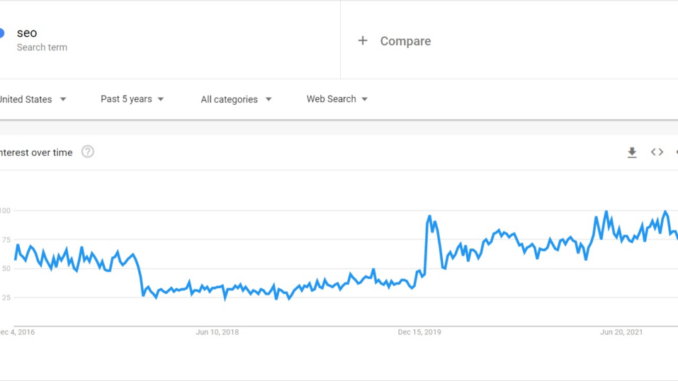
Google Trends is one of those platforms that is often ignored by SEO content writers. And it’s a shame.
First of all, it’s a completely free platform. More importantly, it’s the place where you’ll find data based on actual search volumes.
Paid SEO tools usually offer estimates extrapolated from various data providers. I’m not saying that they are useless – not at all! They offer more than search volume data, so paid tools are always a good thing to have in your SEO arsenal.
But if you want more data (and more accurate data) try pairing the information from your paid SEO tool of choice with a few Google Trends queries.
Not sure where to begin? Here’s how we use Google Trends in my SEO content writing agency:
1. Find Out How Your Keyword or Main Topic Is Going to Fare in the Future
SEO is a game for the long term. Unless you’re optimizing for time-sensitive content (like a new app release or a piece of news), you’re going to want to have your article rank high for years to come. But search volume matters here too.
So find out if what you’re going to write about will be of interest in the future. For instance, since I work in SEO, I might be interested in my own industry’s outlook:
In the last year, there has been a growing interest in this term. While SEO is not a new concept by any means, it’s good to know that it can still spark interest. Even more interesting, you can see how SEO fares against a known “competing” industry, like PPC ads:
2. Compare Keywords or Interest in Topics
When working on new topics for my agency’s blog, my team and I often have to decide if we should add SEO to the mix or stick to content writing or copywriting in general. Google Trends can shed some light on what our audience is more interested in.
This 5-year overview clearly tells me that there is more interest in content writing than SEO content writing:
Now you might say that the choice is obvious. But bear in mind, search volume isn’t everything. If keywords related to SEO content writing have more business value, then I can definitely live with less, but more meaningful traffic. What matters here is that the interest in both seems to be constant.
This is why it’s important to constantly check with Google Trends. As marketers, we need to know if the products or services we are selling are beginning to lose traction. Remember DVDs? Fewer and fewer people do:
This is how the demise of a product looks like. And Google Trends can make you aware of it before it’s too late.
3. Find Related Topics and Related Terms
Yes, you can do that in plain, old Google search too. But Google Trends adds data to this information. You can see which search terms are more popular and which other topics are usually associated with yours.
This can help you plan your SEO strategy for the long run, as well as your current piece of content. The related queries section can be an SEO writer’s goldmine if used properly. For example, you can turn all the related queries into subtitles and thus increase your chances of ranking higher for a wide range of keywords.
More importantly, the results marked with “Breakout” have recently had a huge increase in search frequency, usually due to them being new topics or due to recent changes in the industry. This is another opportunity you shouldn’t miss out on.
4. Learn Where to Focus Your Promotional Efforts
Content writing is very popular in a few states:
In other states, people seem to have almost no interest in the topic. If I were to promote my articles about content writing on social media, for example, why waste money on audiences who have no interest in what I’m trying to sell?
But even if you don’t plan to use paid ads to promote what you write, you can use this information to refine your articles. Let’s say you have an article that already ranks well on a topic that’s popular in Kansas, like mine is. You can add a few references to the state or a few elements of local pop culture to appeal to your Kansas audience even more.
Final Thoughts
Google Trends is a great way to get started on your topic and keyword research. In fact, with a bit of experience with the platform and within your industry, you may not need any other tool to help you put together an SEO plan.
Try it out!
Need help with that plan or with implementing it in articles that rank high and convert readers into leads? Talk to my team of expert SEO content writers, we can help!
The post 4 Ways to Use Google Trends to Take Your SEO Content to the Next Level appeared first on SiteProNews.
Source: Site Pro News
Link: 4 Ways to Use Google Trends to Take Your SEO Content to the Next Level


